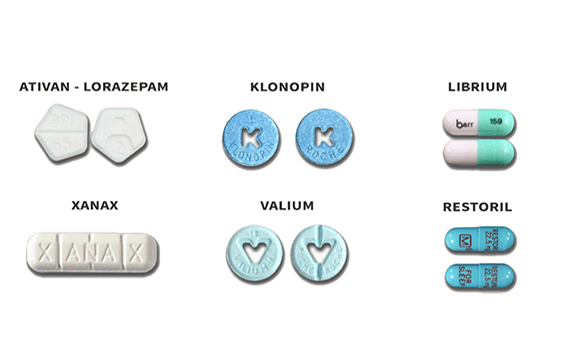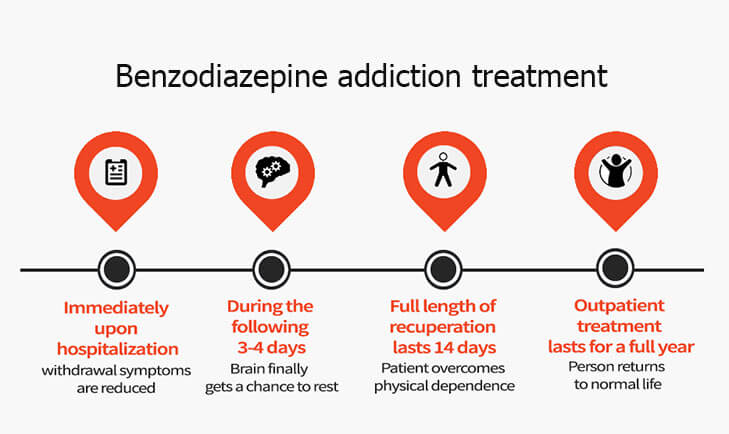Mental disorders such as depressions, anxiety, soul pain, panic attacks, insomnia and obsessive disorders are oftentimes considered diseases of the modern society. However, that couldn’t be further from the truth, considering that they are as old as mankind.
Unfortunately, the truth is that they’ve been exacerbated since the 1900s, as we’ve jumped head first into this sped-up lifestyle. Nowadays, we barely get a chance to see our kids and elderly parents for more than a couple hours each week, let alone take care of our mental state.
Alcohol was the original substance of choice to deal with these issues, with the salt of bromine and the derivatives of barbituric acid taking the leading role half a century ago. Finally, during the 1960s, the new group of medication called benzodiazepines was synthesized. Fast forward to current times and you’ll see that “benzos“ are still in use in hospitals around the world.
However, the truth is that these medications are far from perfect, as they can be the cause of a major addiction on their own. Luckily, with the benzodiazepine addiction treatment, a complete recuperation is possible. It is important to take action as soon as possible, and avoid any unnecessary suffering.
What are Benzodiazepines and where can you find them?
Benzodiazepines, otherwise known as benzos are classified as psychoactive drugs. Despite that fact, they are also very effective as minor tranquilizers, and are used by certified anesthesiologists around the world. While these substances are incredibly effective in short-term use, they become troublesome when a person starts to rely on their effects on a daily basis.
Due to being a relatively simple chemical substance that has been around for decades, it should come as no surprise that benzos are so widespread. Still, these powerful medications shouldn’t be taken lightly, and should only be consumed following the doctors’ instructions.

What are benzodiazepines used for?
There’s no denying that benzodiazepines, tranquilizers and anxiolytics have a vast array of use in medicine. Modern anesthesia protocols would be impossible without the use of benzodiazepines, as they protect the heart from increased levels of adrenaline, which would be potentially life-threatening otherwise. For this reason, these substances are considered to be irreplaceable in cardiology.
Furthermore, benzos are also very effective in the treatment of neurotic disorders, such as:
- Panic attacks
- Insomnia
- Tics
- Prophylactic epileptic seizures
- Neurotic reactions
- Obsessive disorders
Are all Benzodiazepines addictive?
What is the defining characteristic that makes a person an addict? It is the simple fact that they aren’t able to function properly without the substance in their system. What’s more, addicts oftentimes spend their days daydreaming of the second when they will finally get a chance to indulge in the substance that has become their primary occupation.
When they find themselves in a place where they have no access to drugs, they start to panic and the anxiety kicks in. To avoid those situations, they start creating stashes of drugs everywhere they go, be it at work, in all rooms of their apartment, and even in their car. By now, even they start to realize that they’ve become addicted.

Soon after, they discover that growing doses are required in order to achieve the same desired effects. They start to experience benzodiazepine withdrawal symptoms more and more often. People who take benzodiazepines on a regular basis put their organism in a state of stress that stimulates the protective mechanisms of the body. This increased metabolic rate results in an improved ability to eliminate drugs from the system.
It doesn’t take too long before the effects of benzos start to wear off.
On average, after just two to three weeks, the body starts adjusting, and the person has to increase the dosage to experience the same effects as before. In this sense, the addiction to benzodiazepines is no different than those that other addictive psychoactive substances cause.
The never ending race begins. Ultimately, there’s no chance of winning. A person might end up taking 5 times the dose, without feeling the positive sensations. This growing tolerance towards benzodiazepines can be very dangerous. Drugs such as Alprazolam (Xanax), Midazolam (Dormikum, Flormidal) Flunitrozepam (Somnobene, Rohypnol) all become incredibly dangerous.
In some cases, taking huge doses of medication can produce entirely opposite effects to those that we’ve been expecting. For example, people might find themselves unable to fall asleep after taking large doses of sedatives. Even worse, they become restless, agitated and ultimately start to panic.
Benzodiazepine side effects can be frightening
Still, the worst side effects of benzodiazepines are yet to come. It doesn’t take long before the negative effects of constant use of bezos begin to rear their ugly head. Several researches have shown that sometimes it takes only 3-4 months of continuous use before the person’s behavioral patterns begin to change. Quite often, it results in violent behavior where people become unable to control their actions, they become very cruel to everyone around them.
One such case that stands out the most has left the whole medical and juridical practice in a state of shock. A woman, who was under the influence of Halcion (a subgroup of benzodiazepines, produced by Upjohn Company) committed a brutal murder after a domestic dispute. The victim was her own mother. What’s even more perplexing was the fact that she has shown no signs of aggression prior to this outburst.
After a detailed medical, psychiatric and psychological examination, the investigation proved that Halcion was a major factor that contributed to her behavior. The woman simply lost control over her actions while committing the crime. Much to the commission’s surprise, the investigation also shed a light on some staggering data.
It turns out that this case wasn’t as isolated as it seemed at first. Similar cases of people committing violent crimes under the influence of Halcion were unraveled, and subsequently, that lead to a removal of this drug from the market.
Benzodiazepine addiction can also cause:
- Impaired memory capacity
- Decreased alertness
- Emotional dullness
- Loud, aggressive outbursts
- Sleep disorders, including excruciating insomnia
- Impaired coordination
- Hand tremor
- Urinary inconsistence
- Hot-cold flashes
- Frequent shortness of breath
- Fits of arrhythmia and tachycardia
- Epileptic attacks

Benzodiazepine addiction treatment
Prior to even starting the benzodiazepine addiction treatment, every person needs to go through a detailed physical and psychological examination. First and foremost, doctors perform a complete blood count in order to determine the overall health of the patient. Among other things, disorders such as anemia, various infections or leukemia can be noticed through these tests.
The ECG and MRI tests are there to determine whether the patient has suffered any physical injuries. Or whether or not there are signs of any disturbances in the bioelectric activity of the brain. There are also several tests designed to evaluate the patient’s level of anxiety, depression, memory capacity, concentration ability, craving for drugs as well as cognitive functions.
Immediately upon hospitalization, after the initial checkup is completed, the patient starts receiving therapy, which provides instant results in combating the symptoms of opiate withdrawal. In the initial stages of benzodiazepine addiction treatment, the person needs to rest up completely, thus allowing the brain to fully rest and recuperate. This is achieved through pharmacological therapy, which has proven to be very efficient. A good quality sleep is necessary for these changes to happen, and medications with hypnotic effects are used to accomplish it.
Detoxification from benzodiazepines lasts 14 days on average.
During the time, the patient gets to overcome the symptoms of physical dependence, and do so in a safe and comfortable environment. The best results are achieved when the battle is led on both conscious and subconscious levels. Medical experts were looking down on hypnosis for the longest time, but it’s made a gigantic comeback in recent years. When coupled with transpersonal therapy, the end results are amazing. Not only will a person stop feeling dependent on the substance in question, the feelings of resentment and hate towards benzodiazepines will be structured deep inside their core.
As part of the anti-relapse therapy, patients also get advice when it comes to lifestyle. They are advised to avoid provocative situations, and cut ties with people who might put them at risk. A regular maintenance therapy is also prescribed.
See detailed information about benzodiazepine addiction treatment.
